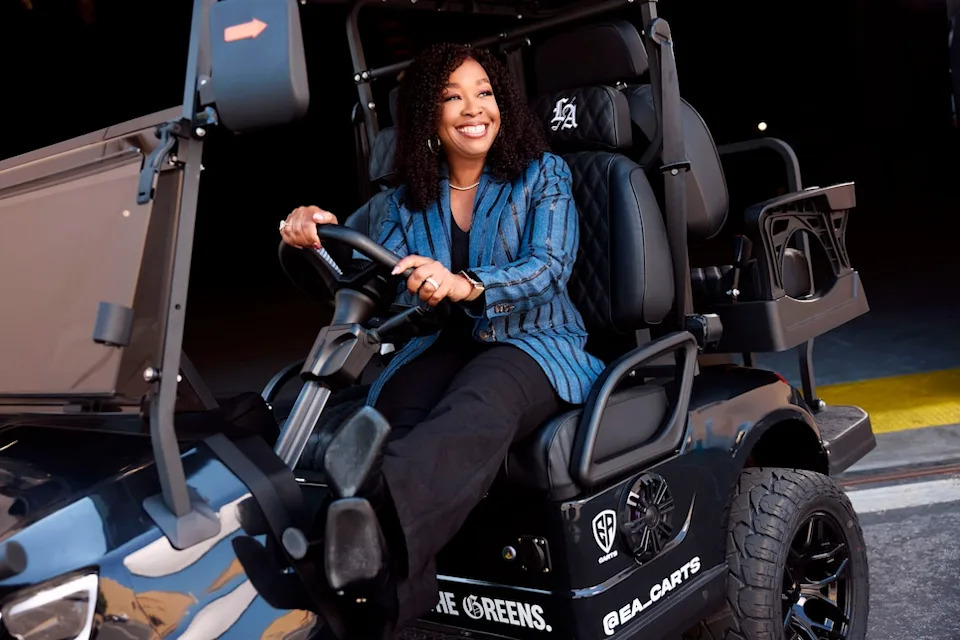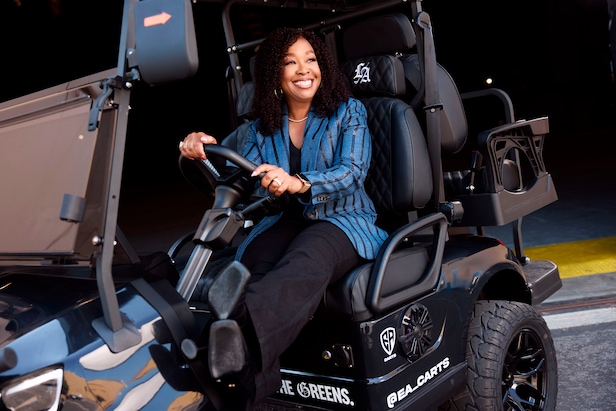Golf wasn’t supposed to be for me.
Let’s be honest about that. Golf was supposed to be for men in khakis who went to prep schools and belonged to country clubs their grandfathers helped found. Golf was supposed to be for people who looked nothing like me, who came from nothing like my background, who moved through the world with the kind of casual confidence that comes from always belonging everywhere you go. I never thought I’d be a golfer. I am not that person. I am someone who spent years being the only person who looked like me at network meetings and award shows and everywhere else success took me. I am someone who learned early that spaces aren’t just handed to you—you have to take them, claim them, make them yours through sheer force of will and excellence.
So when I first stepped onto a golf course two and a half years ago, I felt that familiar sensation of not belonging: the same feeling I’d had in college lecture halls, in studio meetings, in network boardrooms. That prickle of awareness that I was somewhere I wasn’t quite supposed to be, somewhere other people believed I needed to prove I deserved to exist.
The golf course felt like all those spaces rolled into one: manicured, exclusive, quietly intimidating in the way that only truly expensive places can be. I stood there in my brand-new golf shoes, awkwardly trying to look like I belonged, watching other players who moved with the easy familiarity of people who’d been doing this their whole lives.
I was there because of my 9-year-old. I had been curled up on a sofa, minding my business, my head lost in a book, when suddenly she was there, standing over me.
“I would like to learn golf.” Beckett has a strong personality. She’s incredibly intelligent and mature for her age, much more comfortable chatting with the parents of her classmates than with her peers. She is a 45-year-old in a 9-year-old’s body. An old soul. She’s been here before. She came, she conquered, and now she’s back on Earth just for kicks. All of which means that when Beckett says something, she is not kidding.
Beckett is never kidding.
I signed my child up for golf lessons. And because I love my daughter, I decided I should at least learn a little about the game to be supportive of her. Or, you know, to understand what she was talking about at the dinner table.
At least, that’s what I tell people when they ask.
The truth is more complicated. The truth is that the move to New England had resulted in an unintended side effect.
Time.
Sooo much time.
Out of Los Angeles, I had never been happier. Far away from the distractions of being in the office, awake before any of my employees, with plenty of time to care for myself, my work life had become all the things I had longed for—efficient, creative and productive. Meetings ran quickly and cheerfully, stories dreamed themselves into my mind at a furious pace, and my projects were easily completed, so I was suddenly blessed with free time.
A lot of free time. It was a problem.
You know me by now, so I can tell you the truth: I am an ultra competitive, unlaid-back, very intense human being. I did not know how to handle free time to spend however I wished.
Free time made me restless. And irritable. And nosy. I started giving unsolicited advice to people I did not even know.
“You should tighten that stroller strap.”
“I overheard what you said, and you could not be more wrong. Here, let me show you this graph and then I can read you this article …”
“You look much better in blue.”
I was the kind of person you see getting slapped in those YouTube videos. I needed to do something about myself.
My solution was to get a hobby.
First, deciding I could be just like Yo-Yo Ma, I got a cello. My family suffered through months of my attempts to teach myself to play. Unlike Yo-Yo Ma, I have no talent.
So I started cooking again.
Then I planted a vegetable garden. Then I got chickens. I renewed my dedication to my Peloton bike. I watched every episode of Dateline ever produced. But there was still … SO. MUCH. TIME.
Which is why, when Beckett mentioned golf, I was just desperate enough to try it. I decided that I would learn with her. It would be something we could do together.
Beckett took lessons for a year, won an impressive trophy and then promptly quit. She let me down gently, stating matter-of-factly that it was obvious she was far more interested in science and theater than in, as she put it, “hitting balls with sticks surrounded by pollen.”
She had made her point and was out. But by the time she quit, I was hooked.

/content/dam/images/golfdigest/fullset/2023/1/GD1025_VOICES_EXCERPT_02.jpg
REV IT UP: Rhimes is a part owner of the Los Angeles Golf Club in the fast-paced TGL league.
I do not want you to assume that I am this elegantly talented, naturally athletic golfer. I am not.
I AM NOT.
What I am is sweaty. And full of swear words. And low on skill. I spend a great deal of time digging my ball out of the bushes. I have farmer tan lines—my ankles are several shades lighter than my legs in a way that is not OK. My putting is shocking. I hit the ground more often than I hit the ball. In short, I am terrible. Spectacularly, embarrassingly terrible. I am that person other golfers politely step around, the obvious beginner slowing down the pace of play for everyone else on the course. I sucked. I sucked hard.
But here’s the thing about being terrible at something when you’ve spent your whole career being excellent at everything you do: It is humbling in the best possible way. It strips away all the protective layers of competence and success and forces you to be a beginner again. To be vulnerable. To fail publicly and often.
And in that vulnerability, something unexpected happened. I found joy.
I fell in love. Not with being bad at golf—let’s be clear about that. Nobody loves driving a ball into the water seven straight times. But I fell in love with the possibility of getting better. With the pure, mathematical beauty of a sport where you can measure improvement in concrete terms. With the meditative quality of standing over a ball, the world narrowed down to this one moment, this one swing, this one chance to get it right.
I love the simplicity of it. And as a tightly wound, fight-to-the-death, insanely competitive person, I love that my failures are my own and any progress I make is my own, which means my triumphs are also my own. I have no one to compete against but myself. I am my own opponent, and I am my own team captain. If I mess up, it is on me to fix it.
It is beautiful.
Golf became my sanctuary in ways I never expected. Out there on the course, with nothing but my clubs and my thoughts and the endless challenge of trying to hit a small ball into a hole, I found a kind of peace I’d never experienced. The constant noise in my head—the scripts, the meetings, the decisions, the deadlines—all of it quieted down to just the immediate, present-tense challenge of the next shot.
Turns out hitting balls with sticks surrounded by pollen is my jam. I signed up for lessons. At the time, it was not because I loved golf. The love had not happened yet. No, I signed up for lessons because I refused to be defeated by golf. I got clubs—good ones, expensive ones, the kind that made statements about intention and commitment. I practiced. I saved articles about stance and swing and the physics of golf-ball trajectory. I watched YouTube videos of Tiger Woods the same way other people watched my TV shows.
I read books about the history of the game. I studied golf like I was preparing for the bar exam.
More importantly, I kept showing up. Every week, there I was at the country club, getting better one terrible shot at a time. I started noticing other women on the courses, other people of color, other faces that looked like mine scattered among the traditional white-male golfer demographics. We’d nod at each other with the recognition that comes from being pioneers in a space, that quiet acknowledgment of shared experience. We were people who understood what it means to claim your place somewhere you weren’t originally invited.
These days, I have a golf posse—three other women who golf just a little better or worse than I do and have great fun doing it. Our foursome rolls deep, and we roll nerdy. We leave all our mom vibes behind in the locker room. We like to wear matching outfits. We’re loud. We dance on the golf course. Many drinks are poured. Many insults are hurled at the little white balls for not behaving.
It turns out that this seemingly individual sport can be a team effort when you’re doing it with the right women.
By now, you know that I am well-versed in the power of female friendship. I write about it so much because I believe in it.
Meredith and Cristina, Eloise and Penelope, Mellie and Olivia. I have a Ph.D. in finding one’s person.
So, believe me when I tell you that women supporting women in spaces where we don’t traditionally belong creates a kind of magic that is absolutely unstoppable.

/content/dam/images/golfdigest/fullset/2023/1/GD1025_VOICES_EXCERPT_04.jpg
SHONDA RHIMES is a prolific television writer/creator (“Grey’s Anatomy,” “Private Practice,” “Scandal,” “How To Get Away With Murder,” “Bridgerton,” “Inventing Anna,” “The Residence”). The above was excerpted from “Year of Yes: 10th Anniversary Edition” by Shonda Rhimes. Copyright © 2015, 2025 by Ships at a Distance, Inc. Reprinted by permission of Marysue Rucci Books, an imprint of Simon & Schuster, LLC. On sale Oct. 14, 2025.
More From Golf Digest

Golf Digest Logo Smoked: Trying to see golf’s future through Canadian wildfires

Made For Women, By Women Meet 31 women-owned golf brands

Golf Digest Logo Golf Digest’s 50 Best Teachers in America (2026-’27)







